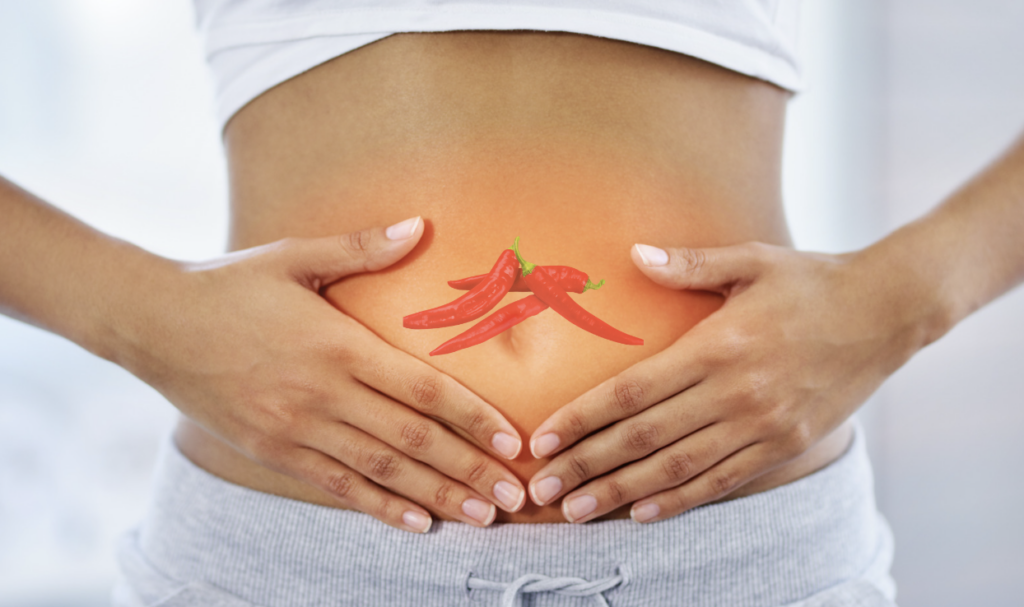What to Eat and Drink
What Does Spicy Food Do To Gut Health
Spicy food lovers, unite! If you can’t get enough of jalapenos or chili peppers, you might be wondering what they do to your gut health. Look no further as we explore the interesting world of spicy cuisine and its effects on the digestive system in this article.

The Science Behind Spicy Food And Its Effects On The Gut
Spices like capsaicin found in chili peppers have been praised for their possible health advantages, but what precisely occurs inside our bodies when we consume these spicy delights? Is it true that spicy foods can cause ulcers, or is this a myth?
To understand the impact of spicy food on the gut, we must first consider capsaicin, the molecule that causes the heat in chili peppers. When eaten, capsaicin attaches to receptors in the mouth, causing a burning sensation. This sensation is subsequently conveyed to the brain, triggering the release of endorphins, which are natural pain relievers. But what about the effects on our digestive systems?
Capsaicin has been demonstrated in studies to stimulate stomach acid output, perhaps improving digestion. It may also encourage the formation of mucus, which serves as a protective barrier for the stomach lining. Capsaicin has also been shown to have antibacterial effects, which may help inhibit the formation of dangerous bacteria in the stomach.
While these effects may appear to be advantageous, it is crucial to remember that everyone’s tolerance for spicy foods varies. Some people may have discomfort or stomach troubles after eating spicy foods, while others may have no problems at all. It’s all about finding the proper balance for your own physique.

Benefits Of Spicy Food For Gut Health
Now that we’ve covered the science behind spicy foods and their impact on the gut, let’s look at the possible benefits they can provide for our digestive systems.
One of the primary advantages of spicy foods is their ability to improve metabolism. According to research, capsaicin can boost thermogenesis, which is the mechanism by which the body produces heat. This rise in thermogenesis might cause a transient jump in metabolic rate, allowing you to burn more calories. In fact, several research suggest that spicy foods may help with weight loss.
Spicy foods can also stimulate the release of endorphins, which not only give natural pain relief but also have a favorable effect on mood. This is especially advantageous for those with irritable bowel syndrome (IBS) or other digestive diseases because it can help relieve stress and enhance general well-being.
In addition, spicy foods may include anti-inflammatory qualities. Capsaicin has been proven to block the formation of some inflammatory molecules in the body, potentially helping to lower gastrointestinal inflammation. This could be especially advantageous for people with Crohn’s disease or ulcerative colitis.

Potential Risks and Side Effects Of Consuming Spicy Food
While spicy foods can be beneficial to gut health, it’s vital to be aware of the risks and side effects that come with eating them.
Spicy foods can irritate the stomach lining and aggravate symptoms in people with sensitive stomachs or illnesses such as acid reflux or gastritis. It can also induce heartburn and discomfort in the chest area. If you have a history of these diseases, it’s better to eat spicy foods in moderation and pay attention to your body’s signals.
Consuming spicy foods may also increase the risk of getting or aggravating ulcers. However, it is crucial to highlight that spicy foods do not induce ulcers. Ulcers are typically caused by a bacterial infection or the prolonged use of certain medications, such as nonsteroidal anti-inflammatory drugs (NSAIDs). If you have a history of ulcers or are at risk, you should contact with your doctor before eating spicy food.

Tips For Incorporating Spicy Food Into A Healthy Diet
If you enjoy spicy foods and want to fit them into a balanced diet, keep the following suggestions in mind:
- Start slowly: If you’re new to spicy food, begin with milder spices and gradually increase the intensity as your tolerance grows.
- Combining spicy foods with nutrient-rich foods: Incorporate your spicy food with veggies, lean proteins, and whole grains to help to balance out your meals.
- Choose homemade sauces and seasonings: Making your own spicy sauces and seasonings allows you to control the ingredients and avoid additional preservatives or unnecessary sodium.
- Experiment with different cuisines: By eating meals from different countries, you can learn about the vast world of spicy food. This can help you explore new flavors and broaden your pallet.
- Listen to your body: Pay attention to how your body responds to hot foods. If you have any pain or digestion concerns, adjust your spice levels accordingly.

Foods And Ingredients That Promote Gut Health When Paired With Spicy Food
While spicy meals might have their own benefits for gut health, specific foods and additives can boost these effects when combined. Here are few examples:
- Yogurt contains probiotics, which can help promote the growth of beneficial bacteria in the gut. Pairing spicy foods with yogurt can assist to neutralize the heat while also providing digestive benefits.
- Ginger, known for its anti-inflammatory effects, helps balance out the spiciness of foods while also relaxing the digestive tract. Consider using ginger in your spicy stir-fries or curries.
- Garlic includes chemicals that can support a healthy gut microbiota. Garlic may provide flavor to hot recipes while also potentially improving digestion.
- Turmeric: This colorful spice is well-known for its anti-inflammatory benefits. Pairing turmeric with spicy recipes can improve overall gut health while also adding color to your meals.

Spicy Food And Its Impact On Digestive Disorders
While spicy foods can be beneficial for gut health, people with certain digestive conditions should exercise caution. Individuals with gastroesophageal reflux disease (GERD) or peptic ulcers, for example, may discover that spicy food exacerbates their symptoms.
If you have a digestive condition, you should contact with your doctor before integrating spicy foods into your diet. They can make unique recommendations based on your specific condition and assist you in finding the optimal balance for your gut health.

Balancing Spice Levels For Individuals With Sensitive Stomachs
If you have a sensitive stomach or suffer discomfort when eating spicy foods, there are methods to enjoy the flavors while reducing the risk of adverse effects.
One solution is to substitute milder spices or lessen the amount of spice used in dishes. This lets you savor the flavors without overpowering your digestive system. Additionally, mixing spicy foods with other stomach-soothing components, such as yogurt or ginger, can be useful. Experiment with different combinations and listen to your body’s signals to find the best balance for you.

Common Myths And Misconceptions About Spicy Food And Gut Health
When it comes to spicy foods and their impact on gut health, there have long been myths and misconceptions. Let’s refute some of the most popular ones:
- Spicy food causes ulcers: As previously stated, spicy foods alone do not cause ulcers. Ulcers are typically caused by a bacterial infection or the prolonged use of certain drugs such as NSAIDs.
- Spicy food harms the stomach lining: While spicy foods can irritate the stomach lining in those with sensitive stomachs or other diseases, they do not cause permanent damage.
- Spicy food causes digestive problems: While some people who have digestive disorders may find that spicy food aggravates their symptoms, it does not cause them.
- Spicy food causes hemorrhoids: There is no scientific evidence to back up the belief that spicy foods cause hemorrhoids. Hemorrhoids are typically caused by increased pressure on the veins in the rectal area.
Conclusion
In conclusion, spicy food can be good or bad for your gut health, based on your personal tolerance and the conditions you are in. It might help with digestion, speed up the metabolism, and reduce inflammation, but it can also irritate the lining of the stomach and make symptoms worse in people with sensitive stomachs or certain digestive diseases.
When you first start eating spicy food, it’s important to pay attention to your body. Start with lighter spices and add other gut-friendly foods to your meals. You can make your food more interesting while still keeping your gut healthy if you find the right mix. Don’t be afraid of the heat; enjoy the tastes of hot food!


